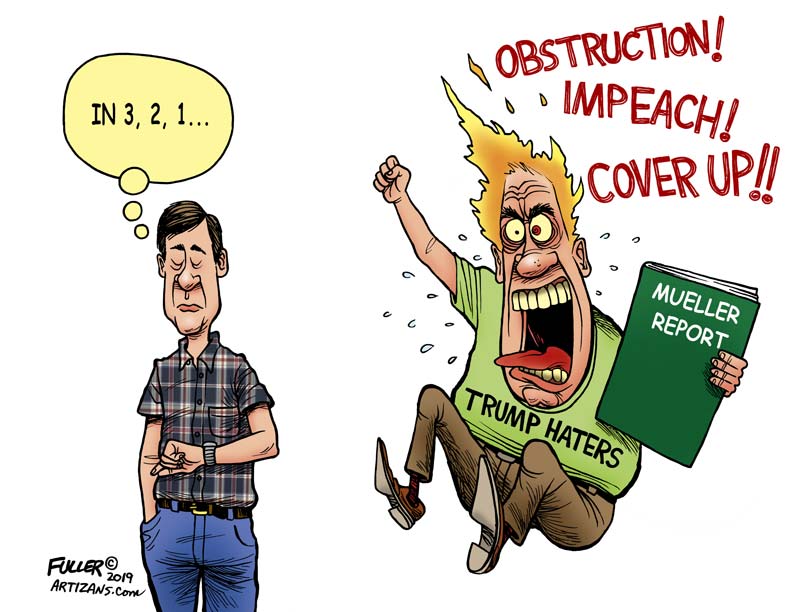
He invented an extraconstitutional legal standard for his obstruction investigation and acted, at the very least, in violation of the spirit of the special counsel regulations.
His departing act was a public statement meant to influence the public debate in a manner inappropriate for a prosecutor, in part because the public report he wrote that was inappropriate for a prosecutor failed to achieve clarity despite its hundreds of pages.
A hallmark of the Trump era is that the norm-defying president goads everyone appalled by him to violate norms. The retired Marine and former G-man would seem least likely to fall prey to this dynamic, but here we are: He has put on a master class in how a prosecutor shouldn't behave.
First and foremost, Mueller ditched the presumption of innocence, a bedrock of the American legal system. In the normal course of things, all of us are considered innocent unless a jury finds us guilty beyond a reasonable doubt. Mueller switched this around. Rather than finding conclusive evidence of Trump's guilt, he had to find conclusive evidence of his innocence. Because he didn't find this exculpatory evidence, he deemed Trump "not exonerated," a standard heretofore unknown to the American system.
As he put it in his news conference, in surely one of the more gobsmacking utterances ever made by someone from a Justice Department podium, "If we had confidence that the president clearly did not commit a crime, we would have said so."
If this standard had been applied to any person other than Donald Trump, it would have been widely denounced and the American Civil Liberties Union would be crusading to keep it from ever emerging again in any context in America.
It is profoundly inimical to due process as understood under our Constitution and puts the burden of proof on the accused — exactly what our system seeks to avoid.
Naturally, Trump's critics concluded from Mueller's statement that if Trump hadn't been found innocent, he must be guilty. The snarky headline on a New York magazine piece put it aptly enough, "Mueller: Trump is Not Not a Criminal."
Well, you might say, of course Mueller departed from standard operating procedure — he's a special counsel operating in novel circumstances that require novel approaches.
But this is not his writ. A special counsel, under the regulations, is not a freelancer making it up as he goes along. He has the "investigative and prosecutorial functions of any United States attorney." He is supposed to "comply with the rules, regulations, procedures, practices and policies of the Department of Justice."
It is one of the those rules that has caused so much confusion over the obstruction portion of the Mueller report. The DOJ's Office of Legal Counsel has said a sitting president can't be charged with a crime. Mueller explained in his public statement that this ruling led his office to conclude it could "not reach a determination one way or the other about whether the president committed a crime."
So, Mueller by his own account, conducted a two-year investigation knowing from the beginning that he wouldn't make the either/or decision that prosecutors exist to make. Attorney General William Barr was right when he told the Senate Judiciary Committee, "At the end of the day, the federal prosecutor must decide yes or no." Mueller decided neither.
Mueller offered several reasons in his statement for conducting an obstruction investigation anyway. One was to preserve evidence. But for what? The idea that Trump, after losing reelection in 2020, would be prosecuted as a private citizen for firing FBI Director James Comey is manifestly absurd. Another was that a president can be accused of wrongdoing in "a process other than the criminal justice system," i.e., impeachment by Congress.
Here, Mueller is basically describing Volume 2 as an impeachment referral. But this isn't a purpose contemplated by the special counsel regulations, which, again, were written to tether special counsels to Justice Department practice.
The regulations say that the special counsel "shall provide the Attorney General with a confidential report explaining the prosecution or declination decisions." They don't say a special counsel shall fail to reach a prosecution or declination decision, then write a long report for congressional consumption anyway and go out and make a public statement to catalyze congressional action if he thinks his report is being misread.
That Mueller was effectively conducting an impeachment inquiry from within the executive branch represented a significant distortion of our system. It should be up to Congress, not an inferior executive branch official who's the functional equivalent of a U.S. attorney, to launch such an inquiry. Even more bizarrely, because Mueller considered Trump's public statements as potential obstruction, any objections by the president to this quasi-impeachment inquiry were more evidence of alleged wrongdoing.
An institutionalist who lost his way, Mueller will be lionized for the duration because he's been so useful to Trump's opposition, but his performance won't age well — and shouldn't.
Sign up for the daily JWR update. It's free. Just click here.
(COMMENT, BELOW)


 Contact The Editor
Contact The Editor
 Articles By This Author
Articles By This Author